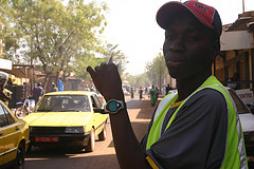In the West African nation of Mali, back street vendors power the mobile phone market. The major players -- Ikatel, a division of France Telecom, along with the homegrown Malitel -- have official stores, but most of their sales come from the street. In West Africa, subscription service is rare. Instead, mobile phone users purchase plastic-wrapped cards of varying denominations, scratch off a silvery bar much like those found on an instant lottery ticket, and recharge their phones with the code hidden underneath. These cards can be purchased from tin-roofed convenience shacks, egg sandwich vendors, or random men walking down the street, stacks of soccer jerseys slung over their shoulders.
It can be difficult, then, to interpret PriceWaterhouseCoopers' recent report "Initial Perspectives on Strategic and Emerging Banking Issues in Key African Markets". The report covers Nigeria (by far the most populous African nation), Egypt, South Africa, Kenya, Senegal, and Cote d'Ivoire: roughly a third of the continent, in terms of population, and a relatively highly developed one at that. The report is strong in hard data, but shies away from interpretation.
iPienso notes that the report discusses "how increased competition in the region has spurred innovation and the introduction of new products, such as mobile banking". But what is mobile banking? Wikipedia rightly notes that mobile banking, or m-banking, "is a term used for performing balance checks, account transactions, payments etc. via a mobile device such as a mobile phone". In Mali, however, mobile banking refers to more informal practices: a trusted member of the community walks around town, visiting clients of the "mobile bank", collecting micro-deposits, tracking them in a graph-ruled notebook.
The PriceWaterhouseCooper report addresses some the most active players in African development, as well as some of the proposed solutions, and as such is an important survey. However, it leaves it to others to address problems, including a recent article posted on AllAfrica.com, "Kenya: Economy Held Back By Lack of Online Payment Authorisation Systems". According to the article, Kenyan Tourism and Wildlife Assistant minister, Raphael Muriungi, said "We are all learning of the rapid and unprecedented changes that ICT (Information and Communication Technologies) is creating in global tourism and have realised if all players fail to embrace the web and new technologies then we stand to lose our ability to communicate and do business in a changing market."
Muriungi is speaking to Kenya's competition with South Africa for tourist dollars, but this is precisely where the aggregated power of mobile phones enters the picture. I watched, from the roof of my home in Kayes, Mali, as dusty pallets of clothing arrived on the back of a truck at a wholesaler just down the street. As if by intuition, crowds gathered to pick through the bundles and purchase that they would later sell at local retail prices. Their mobile phones had alerted them to the impending delivery. It's a very small step from this to managing a bank account via SMS and applications distributed via mobile phone.
Just as wireless technology is enabling Africa to skip past the need for landlines to provide telephone service, so too can it obviate the need for a physical bank in every town. We just need to remember that the Nigerias and the South Africas -- those countries where Western financial institutions might see an immediate profit -- are not all of Africa. Mobile phones can level the playing field as never before, for the benefit of the entire continent.
For a more scholarly view on mobile telephony and mobile banking, check out Jonathon Donner's pages.
Photo Courtesy RobinElaine (Creative Commons, Flickr)


Post new comment